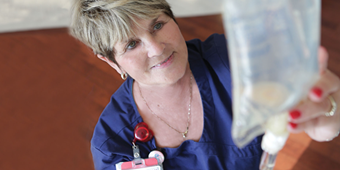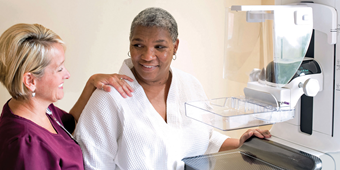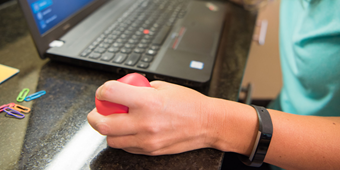Colorectal Cancer Survivors: Tips for Living Well

Answer a few questions and we'll provide you with a list of primary care providers that best fit your needs.
You’ve survived colorectal cancer and treatment, and that’s reason to celebrate. But your cancer experience often doesn’t end with your last treatment.
In the first year following treatment, it can be tough to feel healthy again. You may feel fatigue, changes in bowel habits or bladder function, or other side effects of radiation therapy or chemotherapy.
Many patients benefit from counseling or a support group. The good news is that so many advances have made it possible to live a normal life once you get through the grieving and adjustment phases.
Create a Survivorship Plan
For years, physicians have helped patients transition to life after cancer (or to living well despite cancer that cannot be cured). There’s a growing movement among cancer organizations to formulate a Survivorship Plan to focus on quality of life post-treatment.
These are key components of a Survivorship Plan:
Get physically fit. Exercise 20 to 30 minutes a day, work on getting to a healthy weight and eat a healthy, Mediterranean-style diet, with more plant foods and fewer meats.
Don’t smoke and limit alcohol consumption to further boost your chances of warding off colorectal cancer. Since drinking alcohol is more closely linked to getting colorectal cancer than having it recur following treatment, talk to your healthcare provider about what’s best for you.
Get follow-up care. Surgeons often follow patients for at least five years. It’s very important to have a physical exam every three to six months. There’s a blood test called carcinoembryonic antigen (CEA) that can look for tumor markers in your blood that would indicate cancer has returned. Depending on the stage of your cancer, you may need a CT scan every six to 12 months for the first two years to make sure cancer hasn’t recurred.
In addition, it’s important to have a one-year follow-up colonoscopy. If that’s normal, you’ll likely have routine colonoscopies every three to five years.
Advances have made it possible to live a normal life.
Get support. Whether you turn to friends, family or a community group for emotional support, don’t be afraid to ask for the help you need. Opening up to family members also creates dialogue about screening for siblings or children who might be at risk for colorectal cancer.
Identifying a point person for a Survivorship Plan helps you to feel that you’re not carrying the burden of your cancer alone. It gives people a good feeling to know they have someone they can contact at any time. It could be a primary care physician or a medical oncologist. Your physician is your partner in this and that takes away a lot of the stress.

The American Cancer Society and other organizations have support groups for cancer survivors.
If you have received an ostomy bag to collect stool, the United Ostomy Association has support groups in Dayton and throughout the country to help you adjust.
Usually the bowel is put back together after surgery, but in cases of emergency surgery or some rectal cancers, surgeons need to do a colostomy.
Today, colostomy bags are so discreet that you can “bike, swim or put on a nice dress and no one sees it.
Answer a few questions and we'll provide you with a list of primary care providers that best fit your needs.
Source: American Cancer Society




